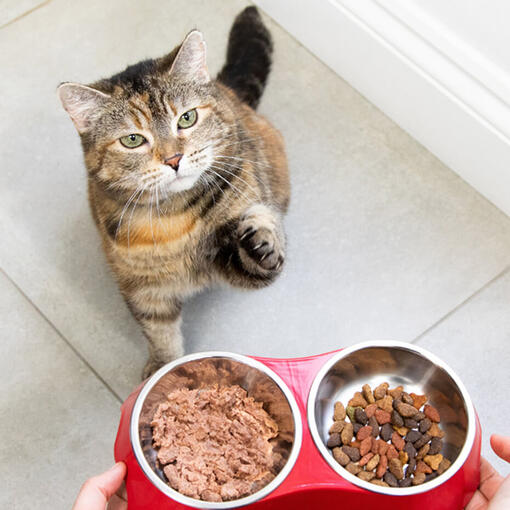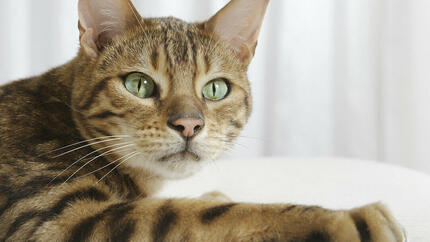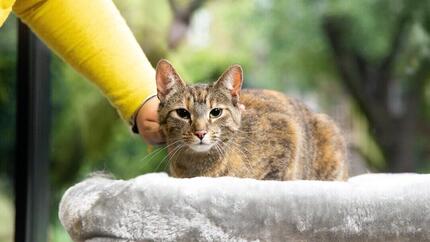
Cats are the masters of the internet, and it probably very often happens that you come across different photos of them displaying very human-like facial expressions. Grumpy cats, happy cats, sad cats – they’re just like us, you might think. But are their facial expressions really the same as ours - can cats smile, or laugh, or look sad?
If you’re the proud owner of a feline, you know that there’s more to the way they show their feelings and communicate with you but even though they might have facial expressions that seem to resemble smiling or laughing, these expressions are not necessarily connected with the way they feel.
Can cats laugh?
Although laughter has been shown in some animals, with all our current scientific knowledge, it seems that cats don't laugh – although they do have their own noises to indicate they are happy.
They do have the ability to make facial expressions that look like smiling or even ‘silent laughs’, but this doesn't mean they are happy.
Even though there are no indications that cats can laugh, it certainly doesn’t mean that they don’t feel or show happiness. In case you're wondering, even though cats can't laugh, they do seem to recognise human laughter and they do seem to empathetically know when you're feeling happy, sad, or even sick. For example, if you laugh at them, some might almost look embarrassed. If, on the other hand, your cat is mischievous and loves attention, they might seem to try their best to make you laugh by doing things that they know you enjoy.
The bottom line however is ‘who needs a laugh when you can purr?’
Can cats smile?
Yes, but a cat’s smile will be different from a human smile. While some cats might be able to display what looks like a grin, happiness or being content is not necessarily conveyed thorough facial expressions. Your feline friend is most likely to sketch a smile when they’re relaxed and calm, and they have their mouth closed, without showing any teeth. If you also notice them narrowing their eyes and blinking slowly, this might also be associated with showing happiness.
Both facial expressions and body postures have different meanings depending on the context in which they occur. In other words, they are like polysemous words where the word has one meaning or another depending on the context. Therefore, it's important to mention that this described facial expression of happiness could, depending on the context, indicate that the animal is stressed or in pain.
It's important to also know that even though your cat might be happiest cat around, they may not show it in a way a demonstrative way that humans tend to recognise. So, don’t feel disappointed if they don’t externalise their feelings and seem to act indifferent – they still love you.
How to know if your cat is happy
Even though cats cannot laugh, when they’re truly bonding with their owners, they will find different ways to show their affection. Here are a few you might recognise:
- Asking for attention
Soliciting affection from you by pushing against your hand – and when you give it to them, relaxing into you and half closing their eyes in bliss. This might be a time when you think you can spot a feline smile!
- Purring
Purring might be the closest thing that comes to laughing. Keep in mind though that cats can also use purring as a way of staying calm in stressful situations and soothing themselves. This is something that can often be seen when you visit your vet. It’s all about the context. If you are home relaxing with your cat and you hear that tell-tale purr, you can be sure they are happy, content and expressing their affection, It’s important to pay attention and learn the differences between a happy purr and a stressed one so you can recognise when they may be struggling and try and diffuse the situation to lower their stress levels.
- Rubbing against your leg or feet
This can happen at any time, and it most often occurs when they haven’t seen you for a while. If you’re returning home and your cat goes out of their way to be close to you, this is their way of showing you they’re happy and excited that you’re back. Or it’s dinner time!
- “Making biscuits” on you
Also known as kneading, cats do this when they’re happy, relaxed, and content. It often happens when they’re being petted or when they’re settling in for a nap.
- Meowing
The ability and vocal richness of cats is incredible. Meowing is a cat’s way of communicating with you and often this is telling you they’re happy you’re there (or they want something from you!). However, they might also meow for different reasons, for example, if they’re in pain, ill or frightened by something. All cats meow differently depending on breed, individual and situation. Learn your own cat’s meows so you can your own cat, what they are feeling and what they are trying to tell you.
What is fascinating is that cats rarely mew to each other and it is a language that cats have largely created to ‘talk’ to their humans.
- Cuddling
If your cat gets close to you and touches you with their paw, that’s also a sign they’re happy. When they’re cuddling next to you, they might even purr to show that they’re content. Like humans however, not all cats like to cuddle or have close physical contact. They are just content and secure being close to you. Let your cat show their love in their own individual way.
Four ways of making your cat happy
Contrary to popular belief, cats are simple creatures. Give them enough enrichment, attention, care and love, and they are sure to be happy. In case you’re looking for ideas on how to best spoil your feline friend, here are a few.
1. Cats like spending time with you and playtime can be a great way of bonding. Give your furry friend your attention and keep them entertained by playing games. A game of fetch, or hide-and-seek, or toys that give opportunities to get an outlet for their hunting and pouncing behaviours, will not only help with physical and mental stimulation but will also improve your cat’s mood. Enrichment toys like cat trees that have lots of different levels can be a cat’s idea of heaven. Some cats love to supervise the neighbourhood as well – and so somewhere comfortable to watch out of the window can be a great source of enrichment for some cats.
2. A clean and tidy cat is a happy cat. Although they’re usually perfectly able to keep themselves clean, if you have introduced grooming when your cat was a kitten, they will often appreciate a good brushing occasionally to help keep their coats shining. When it comes to feline beauty care however there is nothing like a good pawdicure. Make sure you give them plenty of scratching post opportunities to keep those claws in tip top shape. With a bit of trial and error, you can find the perfect surface that your cat likes to use for their claw care – and the best angle.
3. Offering your cat their favourite treats is by far the easiest way of making them happy, and any pet for that matter. But remember to only use treats in moderation as too many of them can affect their health and waistline. If you have a very playful – or predatory - cat, food dispensing toys can give both treats and enrichment, as can hiding food around the house for them to hunt out.
4. Boosting your cat’s happiness can also be achieved by doing something as simple as cuddling – or just letting them use you as a cat bed if cuddling isn’t their thing. Some cats crave company more than contact. This shows care, affection and it’s sure to make them feel cosy and comfortable at the same time. Always let your cat instigate physical contact rather than grabbing them for hugs – or allowing other family members to do so. The more they can trust you to respect their boundaries, the more likely they are to solicit affection because you are ‘safe’.
Secure bonds are built upon trust. To establish a strong connection, provide the opportunity for them to choose what they want to do in each moment. In other words, don't compel them to engage in activities they don't desire; offer the possibility, but without imposing.
Want to learn more about a cat’s behaviour and how to make sure they’re feeling happy? Read our guide on Understanding Your Cat’s Body Language next.









